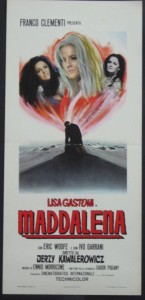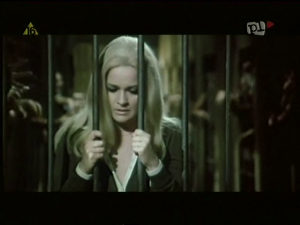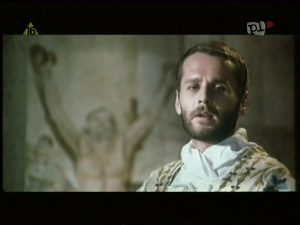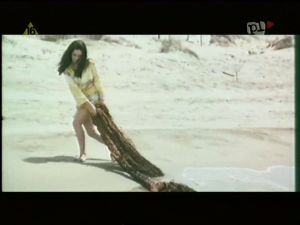Maddalena (Jerzy Kawalerowicz) (1971)
Maddalena
Directed by: Jerzy Kawalerowicz in 1971
Maddalena is an ambituous Italian / Slovenian production for one of the masters of post WWII Polish cinema, Jerzy Kawalerowicz. The movie also tried to launch it’s female protagonist, Lisa Gastoni (an Italian actress famous for her portraits of dissatisfied upper class women, often problematic and troubled), in the orbit of the art-house cinema, an operation which, like the movie, has been accomplished only partially.
The movie revolves around the quest for Maddalena’s (Gastoni) impossible love for a nameless priest.
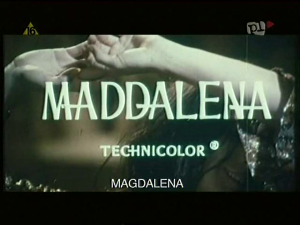
Maddalena is an unsatisfied upper class woman, sleazy and decadent, who uses sex and sensuality as a mean to escape from boredom, from existential tedium and statis and from a difficult, traumatic, past (whispered by the allusion that the onirical and visionary images that the occasional memory of it that the movie throws at the audience).
She is also trapped in a life of illusion and falseness, into the cage of roles that aren’t her own, thus resulting in a neurotic splitted life, at the point of giving life to a phantom double (the blonde version of Maddalena that sometimes appears on screen).
For there reasons, she desires an impossible love, a love of redemption and salvation which the priest can’t give: he’s crushed by guilt, full of doubt and remorse, with a faith lost or at least in deep crisis, an insecure and distant, cold man. Like other work by Kawalerowicz, this movie is deeply critical with the institution of the Catholic Church, portrayed as a generator of guilt and sentimental and sexual repression.
The whole picture runs on these binaries of a missed encounter and double failure, exploring a lot of themes linked to these two: existential doubt, solitude, the difficulty of breaking the chain of internal cravings and dependecies, the profound and deep desire of love, both spiritual and physical, and it’s relationship to the sacred and the religion and it’s symbols.
All of this is often told and narrated in a way somewhat similar to the one of Antonioni, with it’s focus on machines, separation, distance, alienation, failure to communicate, while in other moments the movie adopts an introspective dimension of melancholy and nostalgy, even in the happy moments, which is very suited for it.
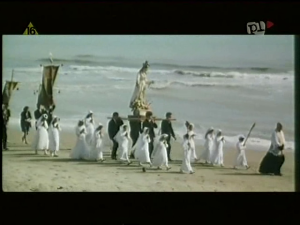
Often Kawalerowicz uses subjective shots and uses a language made mostly of symbols, images, and allusions, often related to the symbolic dimension of Christianity, sometimes in a very provocative way (one of the most interesting parts of the movie is one in which Maddalena enacts, in her way, some episodes and images of the Bible, like the building of the Ark, the fishing with a net, etc), while in other occasions a more surrealist with a strong ironic vein is used.
The rythm is very, very slow, with a lot of voids and silences, broken only by the wonderful Morricone’s soundtrack (with two of these songs becoming very famous: “Come Maddalena” and “Chi mai”). A lot of the dialogues also sometimes sound like more long monologues.
All of this is overall sounding very good, but the movie has it’s serious flaws too, which sadly partly invalidates it. The main problem is that the movie itself is very repetitive, in particular during it’s second half, and it sometimes loses the point, becoming dispersive and vague, thus becoming a full success in the aestethic side (the direction is very tasteful, elegant and classy and the images are powerful, well shot and very captivating) and only a partial success on the side of the contents, even if they are full of interesting and clever food for tought.
The two protagonists, on whom the movie relies most of the time, offer a very good performance, in particular Lisa Gastoni, who successfully gives a portrait of great intensity and sensuality, interpretating a role which became a trademark of hers.
